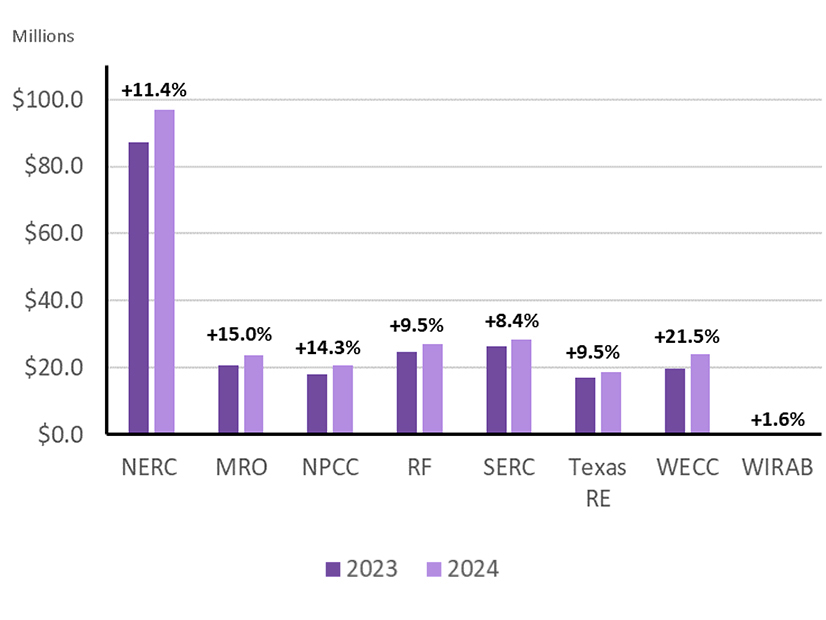Industry stakeholders urged NERC to focus on keeping cost increases in check in their reactions to the ERO Enterprise draft 2024 business plan and budget.
NERC and the regional entities submitted their draft budgets in May, projecting an overall ERO Enterprise budget of $275.4 million, up $25.2 million from the 2023 budget. (See Personnel, Meeting Costs Drive 2024 ERO Budget Hikes.) Each RE’s budget, along with NERC’s is set to grow by at least 8%, while the ERO’s overall assessment is planned to rise from $214.1 million to $240.1 million. Most of the organizations cited growing personnel, investments in technology, and rising travel costs after the COVID-19 pandemic to explain the planned increases.
NERC’s projected spending of $110.6 million is, as usual, the largest share of the ERO’s overall budget. While this amount is only slightly higher than that predicted in the 2023 budget — and the organization’s planned $97 million assessment is actually slightly less than last year’s projection — multiple respondents worried about not only this year’s budget, but also those planned for 2025 and 2026, which are slated for increases of 11% and 7.2% respectively.
A commonly expressed concern was the belief that the rising assessments would have to be passed on to utilities’ customers in the form of higher electric rates. Bonneville Power Administration and others warned that “the noticeable budget increases proposed by NERC [will] directly translate to budget pressure on registered entities,” and wondered if such pressure is necessary given the economic climate.
“We recognize costs are on the rise across the board,” BPA said. “As we look to the future, we feel it is our responsibility to highlight [that] those increases are acceptable when they are both a direct path forward supporting each organization’s core mission and are applicable to the region(s) they impact.”
The National Rural Electric Cooperative Association similarly argued that the ERO should consider “more cost-efficient methods” to achieve its goals. Highlighting the intended headcount expansion across the ERO, with nearly 45 full-time equivalent positions to be added in 2024, NRECA pointed out that “many stakeholder organizations are maintaining or lowering headcount through 2024.”
Additionally, NRECA questioned why only about 31% of NERC’s budget was slated to go to standards development and compliance monitoring and enforcement, with the rest earmarked for “areas that were initially supplemental to the intent of the ERO” such as the Electricity Information Sharing and Analysis Center, the Cybersecurity Risk Information Sharing Program, and NERC’s event analysis and situational awareness programs. NRECA requested that future drafts explain why such a large amount would go to these areas.
The Ontario Independent Electricity System Operator joined NRECA in urging NERC to consider using some of its reserves to reduce the assessment, claiming that “assessments for Canadian entities are likely to increase” more than those for U.S. entities due to the way assessments are calculated in Canada. IESO also supported Electricity Canada’s call for NERC to ensure Canadian regulators are briefed on its projected spending.
Pushing for greater savings, NRECA even suggested that NERC reconsider whether it needs its Atlanta office at all since transitioning “to a predominately remote work organization” during the pandemic. NRECA argued that keeping the office for meetings is unnecessary because “there are many other alternatives available for these types of engagements.”
The only other stakeholder to touch on the Atlanta office issue was the ISO RTO Council Standards Review Committee, which did not commit to a position on the matter but acknowledged that “a space where meetings can be scheduled on short notice … is important to have.” Referring to NERC’s recent stakeholder survey about the office, the IRC SRC encouraged the ERO to “find the most cost-effective solution to retain this capability.”
NERC and the REs’ final business plans and budgets are expected to be presented at the August meeting of NERC’s Board of Trustees in Ottawa, Ontario.




